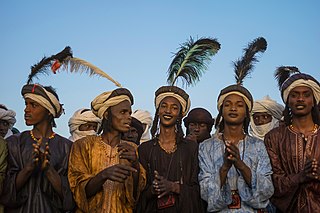
The Fula, Fulani, or Fulɓe people are an ethnic group in Sahara, Sahel and West Africa, widely dispersed across the region. Inhabiting many countries, they live mainly in West Africa and northern parts of Central Africa, South Sudan, Darfur, and regions near the Red Sea coast in Sudan. The approximate number of Fula people is unknown, due to clashing definitions regarding Fula ethnicity. Various estimates put the figure between 25 and 40 million people worldwide.
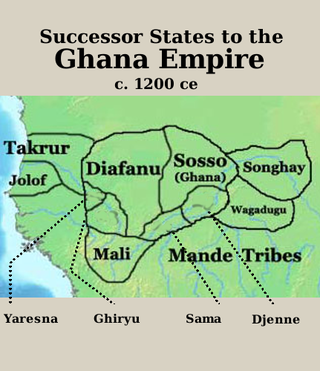
Takrur, Tekrur or Tekrour was a state based in the Senegal River valley in modern day Mauritania and Northern Senegal, Northwestern Africa, which was at its height in the 10th and 11th centuries, roughly parallel to the Ghana Empire. It lasted in some form into the 18th century.
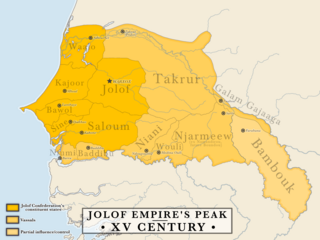
The Jolof Empire, also known as Great Jolof, or the WolofEmpire, was a Wolof state that ruled parts of West Africa situated in modern-day Senegal, Mali, Gambia and Mauritania from around the 12th century to 1549. Following the 1549 battle of Danki, its vassal states were fully or de facto independent; in this period it is known as the Jolof Kingdom.

Fouta Djallon is a highland region in the center of Guinea, roughly corresponding with Middle Guinea, in West Africa.
Bakel is a town and urban commune, with a population of 18,939, located in the eastern part of Senegal, West Africa. The town is located on the left bank of the Sénégal River, 65 kilometers (40 mi) from the Malian border and linked by canoe ferry to the village of Gouraye in Mauritania.
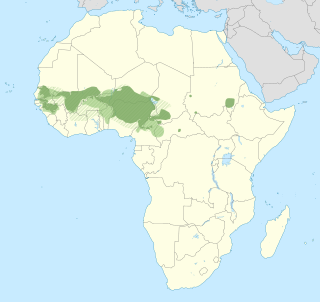
Pulaar is a Fula language spoken primarily as a first language by the Fula and Toucouleur peoples in the Senegal River valley area traditionally known as Futa Tooro and further south and east. Pulaar speakers, known as Haalpulaar'en live in Senegal, Mauritania, the Gambia, and western Mali. The two main speakers of Pulaar are the Toucouleur people and the Fulɓe. Pulaar is the second most spoken local language in Senegal, being a first language for around 22% of the population. This correlates with 23.7% of the country in which Pulaar is the population's ethnicity. Pulaar is one of the national languages of Senegal alongside 13 others. It was admitted as an official language of Senegal by Presidential decree in 1971. There are around 28 known dialects of Pulaar, most of which are mutually intelligible with each other. The Pulaar dialects, as well as other West African languages, are usually referenced under the umbrella term ‘Fula’. Pulaar as a language, however, is not usually referenced as ‘Fula’.

The Toucouleur people or Tukulor people, also called Haalpulaar, are a West African ethnic group native to the Futa Toro region of Senegal. There are smaller communities in Mali and Mauritania. The Toucouleur were Islamized in the 11th century; their early and strong Islamic heritage, which is seen as a defining feature, is a "matter of great pride for them". They were among the first Muslims in the area that became Senegal. They were influential in the spread of Islam to West Africa in the medieval era.

Hadji Oumarûl Foutiyou Tall, born in Futa Tooro, present-day Senegal, was a Senegalese Tijani sufi Toucouleur Islamic scholar and military commander who founded the short-lived Toucouleur Empire, which encompassed much of what is now Senegal, Mauritania, Guinea and Mali.

The Tukulor Empire (1861–1890) was an Islamic state in the mid-nineteenth century founded by Elhadj Oumar Foutiyou Tall of the Toucouleur people of Senegal.

Ksar el Barka is a ruined town in Mauritania. In 2013 it had a population of 7,037.
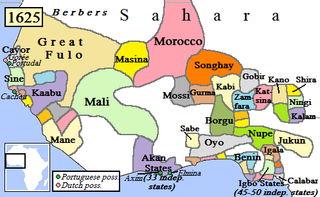
The Empire of Great Fulo, also known as the Denanke Kingdom or Denianke Kingdom, was a Pulaar kingdom of Senegal, which dominated the Futa Toro region from the early 16th century to 1776.
The Char Bouba war, also known as the Mauritanian Thirty Years' War or the Marabout War, took place between 1644 and 1677 in the tribal areas of what is today Mauritania and Western Sahara as well as in the Senegal river valley. It was fought between the Sanhadja Berber tribes and Muslim populations in the river valley, led by Lamtuna Imam Nasr ad-Din, on one hand; and the Maqil Arab immigrant tribes, foremost of which was the Beni Hassan, as well as the traditional aristocracies of the Wolof states on the other, supported by the French.

The Imamate of Futa Toro was a West African theocratic monarchy of the Fula-speaking people in the middle valley of the Senegal River, in the region known as Futa Toro. Following the trend of jihads in the late 17th century and early 18th century, the religious leader Sulayman Bal led a jihad in 1776. His successor, the expansionist Abdul Kader defeated the emirates of Trarza and Brakna and by his death in 1806, power became decentralized between a few elite families of Torodbes. Threatened by both the expansion of the Toucouleur Empire and the French in the mid-19th century, Futa Toro was eventually annexed in 1859. By the 1860s, the power of the Almamy became nominal and the state was further weakened when a cholera epidemic killed a quarter of its population in 1868.
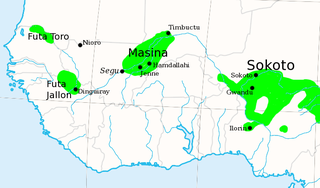
The Fulajihads sometimes called the Fulani revolution were a series of jihads that occurred across West Africa during the 18th and 19th centuries, led largely by the Muslim Fulani people. The jihads and the jihad states came to an end with European colonization.

The Kingdom of Jolof, also known as Wolof and Wollof, was a West African rump state located in what is today the nation of Senegal. For nearly two hundred years, the Wolof rulers of the Jolof Empire collected tribute from vassal kings' states who voluntarily agreed to the confederacy. At the 1549 Battle of Danki, however, the Buurba Jolof was defeated by the lord of Kayor, resulting in the rapid disintegration of the empire. Jolof survived as a rump state, unable to access the Atlantic trade between its former vassal territories and the Portuguese.
The Zawaya are tribes in the southern Sahara who have traditionally followed a deeply religious way of life. They accepted a subordinate position to the warrior tribes, whether Arab or Berber, who had little interest in Islam. The Zawaya introduced Sufi brotherhoods to the black populations south of the Sahara. The jihad movements of the Fula people in the eighteenth and nineteenth centuries have their origins with the Zawaya. Today the Zawaya are one of the two noble castes of Mauritania.
The Torodbe; singular Torodo were Muslim Toucouleur clerics and theocratic monarchs who preached and reigned in Futa Toro, a region located in the north of present-day Senegal, and other Fula communities in West Africa from at least the seventeenth to the early twentieth century. Drawn from all ethnicites and levels of society, the Torodbe aimed to 'purify' the Islam practiced in West Africa and establish Islamic states run with Islamic law.
Koli Tenguella was a Fulani warrior and leader who was pivotal in establishing the Empire of Great Fulo.

Fuladu or Fuladugu is a historic region and former Fula kingdom in the Upper Casamance, in the south of Senegal, and including certain areas in The Gambia and Guinea-Bissau. It was the last independent pre-colonial state in the area, ceasing to exist in 1903.
Tenguella was a Fula silatigi or chief who founded a short-lived state in the upper Senegal river valley, a precursor of the Empire of Great Fulo. He was referred to as the Great Fulo or Great king of the Fulos in Portuguese documents of the time.
















